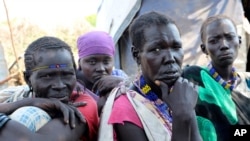The United Nations’ refugee agency and partners are appealing for $1.2 billion to provide life-saving assistance for more than two million refugees from South Sudan. The majority of the refugees are children, living in dire conditions in five neighboring countries.
The hopes that accompanied South Sudan’s independence a decade ago have long since disappeared, pushed aside by a displacement crisis.
Since civil war erupted in December 2013, nearly two million people have been displaced inside the country. Another 2.2 million have sought refuge in the Democratic Republic of Congo, Ethiopia, Kenya, Sudan and Uganda.
U.N. refugee agency spokesman Babar Baloch says the South Sudan refugees are among the youngest in the world. He says more than two-thirds of them are children.
"We are talking about at least…1.4 million South Sudanese refugees being children today under the age of 18," said Baloch. "They include some 66,000 children who have been separated from their parents.”
The South Sudanese refugee crisis is the largest on the African continent. Baloch says most of the South Sudanese refugees are living in remote, under-developed areas in their host countries. He says they are in great need of humanitarian and protection assistance.
"The COVID-19 pandemic combined with climate change-related challenges including severe flooding, droughts and desert locusts have compounded an already dire situation," said Baloch. "Funding is urgently needed to provide life-sustaining assistance, including shelter, access to safe drinking water, education and health services.”
Baloch notes food rations have had to be cut for hundreds of thousands of refugees because of lack of money. He says the pandemic is taking a heavy toll on socio-economic conditions for both refugees and host communities.
He warns conditions will continue to deteriorate for this vulnerable population without generous international support.





